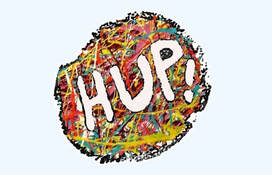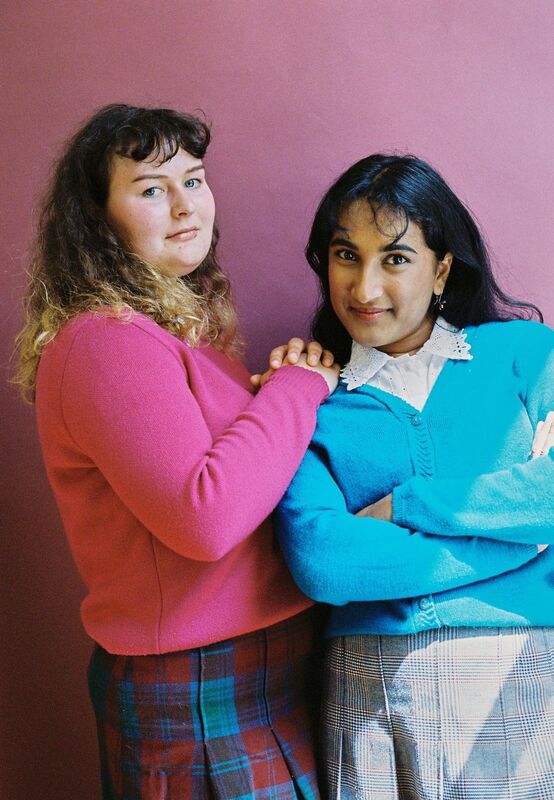|
R E V I E W / I N T E R V I E W
Fruit Juice Parade By Barnaby Greebles Barnaby reviews the wonderful new EP from Fruit Juice Parade, 'the more you question, the further you get from the answer', before putting some questions to the band to discover what makes the Papaioea two-piece tick. A sucker for a bit of novelty in my listening environment, I’m instantly captivated deciphering the oblique drum hooks driving the delicate opening tones of Fruit Juice Parade’s new EP and single. As the collection of vignettes unfolds, their indie-pop roots splay out, but more subtly than in previous releases, tempered by a succession of non-standard chords, almost post-rock-esque crescendos, edgy beats, and roving instrumental segments. Describing themselves as emo (more a reference to the importance of emotional intelligence than to My Chemical Romance) seems more apt for their latest offering, in which Petersen’s voice wafts and soars with a haunting quality, and in which the songs build to soulful caterwauls with cymbals and guitars let loose to take full advantage of their dynamic breadth. Where many bands would rely on effects to increase intensity, Fruit Juice Parade move from tender guitar strokes with syncopated rhythms to more intensive strumming and pounding, relying on their musicianship to push the emotive content to its loftiest reach. Though emotions are valued and lyrics often point to nameable sentiments, the songwriting is decidedly spare. Crisp musical themes are constructed without dalliance or repetition, chiselled into a flourish, and dropped, leaving the listener wanting more. Their songwriting formula – Bowatte penning lyrics for Petersen to turn out melody lines to – is revealed in drum-inspired lines, such as, still our legs move in polyrhythms. Full guitar tones stretch into the low end of the audio spectrum, making the absence of a bass guitar inconsequential. Except for dræyyke’s crescendo of swirling voices and tumultuous guitars, vocal harmonies are reserved, to mellifluous effect, for the purpose of sweetening the quieter moments. The change of scene, now that the members of Fruit Juice Parade have shifted to Pōneke, and the large gap between writing and releasing the songs, gives the EP a sense of nostalgia for their secondary school lives in Palmerston North, where their glowing local reception and success in the Smokefree Rockquest helped spur them into the limelight. Lyrics such as 'growing means the way you look / at the things you knew so close/ expand change shape and colour', makes one wonder how the band looks back on their newly released offerings from the vantage of a new domicile and a growing list of additional musical projects. With innovative songwriting and polished performances, the newly released EP is certainly not holding them back. HUP: It seems there's a bit of a scene erupting in Palmerston North with the likes of The Stomach propelling locals onto the national agenda? With this nourishing background, why did FJP up and move to Wellington? Shannen: There’s not really a lot to it, we just moved to go to uni. It just ended up being a coincidence that we both chose Wellington, and I think we would have been happy with what we’d achieved and felt ok about finishing up at the end of school if we weren’t moving to the same place. HUP: I saw Fruit Juice Parade started making music together during high school. How far back does your friendship go? Has it always been based around musical collaboration or did your musical endeavours stem from an already solid friendship? Shannen: We’ve known each other since intermediate! We were put in the same group for this literature quiz, and every time we didn’t know the answer to something we just wrote ‘Julia Gillard’ and thought it was the funniest thing ever. Silly jokes are still a big part of our friendship. Personally, I think it’s quite important to have a strong emotional bond with your bandmates, so it really helps if you know them before you start writing bangers together. HUP: With The More You Question, the Further You Get From the Answer being the first release since 2018, is there a reason for the lull? Have you been too busy with Sports Dreams, Queen’s Cup, etc, or did you make a conscious decision to take a break? Shannen: We just out-emo’d ourselves and needed a bit of time to figure out how to live in a new town. Which we might have done? Wellington is weird so it’s hard to tell. HUP: The new EP seems somewhat of an evolution, retaining your distinct C86-inspired – experimental within the context of a pop song – veneer, but developing a slickness to the writing and a bit of a step up in terms of production quality. Being in a band can often mean landing on a sound that's a compromise between different members' tastes. Do you find a musical synergy when writing songs or do your creative sparks mould into shape through a more iterative process? Tharushi: As we haven't written a new song since 2019, it's hard to really say what will work for us now. But to answer for our songwriting method between 2015-2019 I would say it was both iterative but also intuitive. We developed distinct band roles, with Shannen writing the guitar parts and giving melodies to the lyrics I wrote. So even if we were "jamming", which is how almost all of our songs started, the roles for arrangement were already delegated. Looking back I can see we really respected and trusted each other as musicians and gave each other the space to feel out our musical ideas. Shannen: I don’t know that we ever thought about making music in terms of compromise, we just found a way to write together that worked and stuck to it. Don’t fix what ain’t broke? HUP: I heard Tharushi (pretty sure it was Tharushi) in an old Bfm interview explaining the motivation behind some of their lyrics saying, ‘There’s a real assumption made that girls aren’t the music makers. They’re just the topic of songs… We’re just kind of fed up with that.’ From appearances on Facebook, it looks like you’re fairly involved with Girls Rock and the Girls Rock Camps? Have you been mentors or attendees in the past and, if so, how much has this organisation influenced your development as a band? Shannen: Our involvement in Girls Rock has come after the majority of our time playing as FJP, but we’ve both been band mentors, volunteers and had more behind the scenes roles in the camps. We’ve met some really lovely, clever and kind people through Girls Rock, all the shows we’ve played for Girls Rock (as FJP and our other bands) have been really safe and friendly environments, to the point where it’s vaguely frustrating that they’re not all like that. HUP: I get the sense, lyrics wise, that a lot of the songs are focused more around personal or relational matters? Does any of the feminist sentiment alluded to above spill over into the song writing? Tharushi: Yes, I've never put it that way, but I wouldn't dispute that FJP is kind of inherently feminist. I can see that we had such a profound urge to push out of the mould and define the narrative for ourselves. We were ambitious, clever, and unapologetic in our songwriting, which are things young women are groomed not to be. "Sand King" is a feminist song about sexism in the music scene. HUP: You’ve had some good gigs, opening for the likes of Elemeno P and Mermaidens. Are there plans to increase your live presence, or even, eventually, look to playing outside NZ (global conditions permitting)? Shannen: Not really sure yet. We just play for fun really, it’s nice that people like the music we make.
0 Comments
Leave a Reply. |
Archives
July 2022
Categories |


 RSS Feed
RSS Feed
